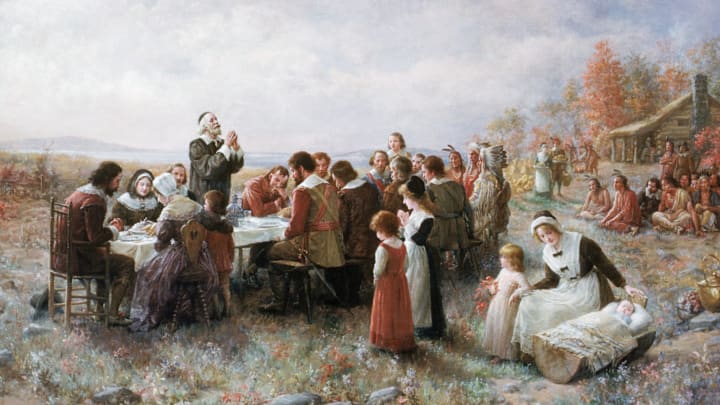The story of the first Thanksgiving has been thoroughly mythologized, and concrete facts from the day are limited. Almost all the information historians have about the event comes from a letter written by Plymouth Colony leader Edward Winslow in December 1621. He wrote of a harvest feast the Pilgrims shared with the Wampanoag over three days in late autumn. The meal would have looked unfamiliar to people who associate Thanksgiving with green bean casserole, marshmallow-topped sweet potatoes, and pumpkin pie: Dishes on the menu included venison and wild fowl.
We don’t know every item that was served at that celebration, but we do know that many traditional Thanksgiving dishes were probably (or in some cases, definitely) absent. When you sit down to dinner on the fourth Thursday in November, be thankful for these foods that weren’t a supermarket-trip away in 1621.
- Green Bean Casserole
- Pumpkin Pie
- Gravy
- Cranberry Sauce
- Mashed Potatoes
- Apple Pie
- Wheat Rolls
- Macaroni and Cheese
- Turkey
- Sweet Potato Casserole
- Bread Stuffing
Green Bean Casserole
Much of the produce associated with Thanksgiving wasn’t present at the Pilgrims’ dinner table. That likely includes green beans, and green bean casserole certainly didn’t make an appearance at the first Thanksgiving dinner. The recipe for green beans baked with cream of mushroom soup and topped with french-fried onions was developed by Campbell’s employee Dorcas Reilly in 1955 for the backs of soup cans. Compared to many “traditional” Thanksgiving dishes, green bean casserole is fairly modern.
Pumpkin Pie

Pumpkin pie wasn’t served for dessert at the first Thanksgiving—nor was any pie, for that matter. The Pilgrims probably didn’t have access to many of the things needed to make pie crust, including butter, flour, and ovens. But that doesn’t mean pumpkin was left out of the meal entirely. The squash is native to the Americas, and cooks at the first Thanksgiving may have roasted it whole or stewed it in a pot.
Gravy
No flour also meant no gravy to go with the venison and waterfowl on the table. Though it’s possible the cooks saved drippings from the meat, it wouldn’t have been the traditional, thickened gravy we know today. One sauce that likely appeared on the menu was green sauce, a condiment that was made by cooking down produce like squash, onions, and spinach into a thick goop. Turkey gravy has never sounded so appealing.
Cranberry Sauce
Another ingredient missing from the Pilgrims’ pantries was sugar. Without it, they wouldn’t have been able to cook down the cranberries that grew in Massachusetts into a sweet sauce. The Wampanoag were known to harvest the berries from local cranberry bogs and dry them to use in dishes all winter. There weren’t any cranberry bogs in the immediate area of the Plymouth Colony, however, so the first Thanksgiving may have lacked the fruit—in sauce form or otherwise.
Mashed Potatoes

Potatoes are native to South America, and they had yet to land in New England at the time of the first Thanksgiving in 1621. That’s probably for the best, because what good are mashed potatoes if you can’t make them into a gravy volcano?
Apple Pie
Without pie crust, apple pie also would have been missing from the inaugural Thanksgiving dinner. The main ingredient was absent as well. Apples still hadn’t made the trip to New England from Eurasia, but that would soon change. By the mid-1600s, cider was the colonists’ drink of choice.
Wheat Rolls
The Pilgrims had no wheat flour for baking traditional bread rolls in 1621. Instead, the first Thanksgiving featured Wampanoag corn bread.
Macaroni and Cheese
This southern Thanksgiving staple wasn’t served when the Puritans and the Wampanoag sat down for dinner in 1621. In addition to the lack of ingredients for making pasta, macaroni and cheese wasn’t eaten in America at this time. Thomas Jefferson is credited with popularizing the dish in the U.S. in the 19th century after first trying it in France.
Turkey
That’s right—the food that’s become synonymous with Thanksgiving probably wasn’t served at the original feast; the birds weren’t common game animals at that time. We do know that the dinner guests did indulge in some type of wild fowl: Duck, geese, swans, and passenger pigeons are all more likely possibilities than turkey.
Sweet Potato Casserole
Sweet potatoes had yet to arrive in New England via the Caribbean in 1621. Mini-marshmallows also weren’t available in the Plymouth Colony.
Bread Stuffing

Modern stuffing—or dressing—is made from a mixture of cubed bread, spices, veggies, and occasionally meat. The mix that stuffed the fowl cooked for the first Thanksgiving wouldn’t have included bread. Onions and nuts were the main ingredients of the breadless stuffing the Pilgrims enjoyed.
Discover More Thanksgiving History:
A version of this story was originally published in 2021 and has been updated for 2024.
